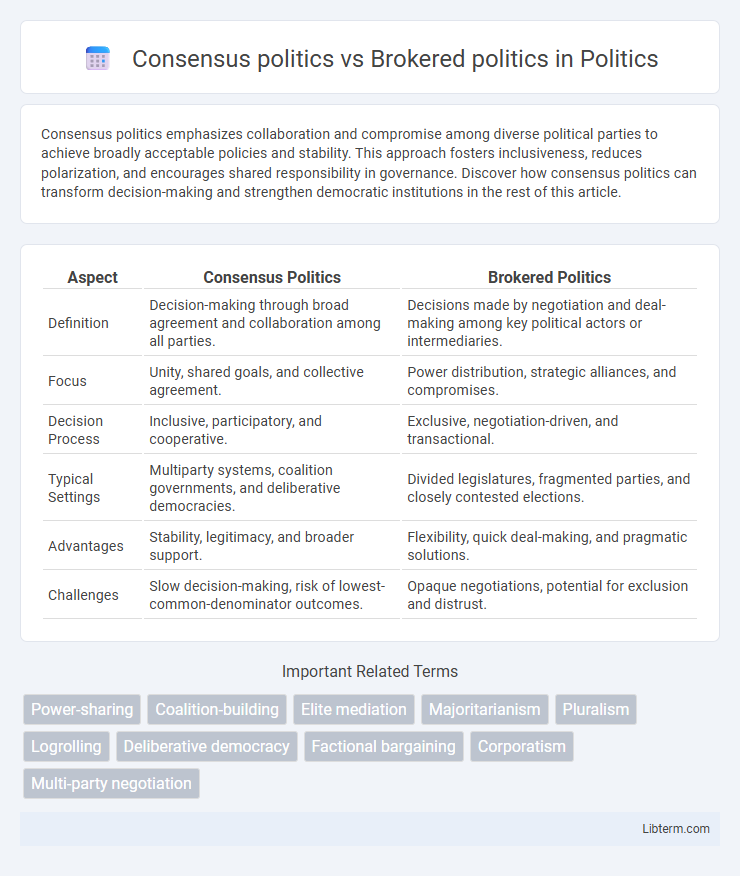Consensus politics emphasizes collaboration and compromise among diverse political parties to achieve broadly acceptable policies and stability. This approach fosters inclusiveness, reduces polarization, and encourages shared responsibility in governance. Discover how consensus politics can transform decision-making and strengthen democratic institutions in the rest of this article.
Table of Comparison
| Aspect | Consensus Politics | Brokered Politics |
|---|---|---|
| Definition | Decision-making through broad agreement and collaboration among all parties. | Decisions made by negotiation and deal-making among key political actors or intermediaries. |
| Focus | Unity, shared goals, and collective agreement. | Power distribution, strategic alliances, and compromises. |
| Decision Process | Inclusive, participatory, and cooperative. | Exclusive, negotiation-driven, and transactional. |
| Typical Settings | Multiparty systems, coalition governments, and deliberative democracies. | Divided legislatures, fragmented parties, and closely contested elections. |
| Advantages | Stability, legitimacy, and broader support. | Flexibility, quick deal-making, and pragmatic solutions. |
| Challenges | Slow decision-making, risk of lowest-common-denominator outcomes. | Opaque negotiations, potential for exclusion and distrust. |
Introduction to Consensus Politics and Brokered Politics
Consensus politics emphasizes collaborative decision-making and strives for broad agreement among diverse political groups, fostering stability and inclusive governance. Brokered politics revolves around negotiation and compromise among competing political factions, often resulting in complex power-sharing arrangements. Both approaches influence policy outcomes and reflect varying degrees of political cooperation and conflict resolution mechanisms.
Defining Consensus Politics: Key Features
Consensus politics emphasizes collaborative decision-making, prioritizing broad agreement among diverse political groups to foster stability and inclusiveness. Key features include power-sharing arrangements, negotiation, and compromise to accommodate differing interests, ensuring policies reflect a wide spectrum of societal views. This approach contrasts with adversarial or brokered politics by seeking collective endorsement rather than reliance on elite negotiations or temporary alliances.
Understanding Brokered Politics: Main Characteristics
Brokered politics is defined by multiple competing factions within a party or coalition negotiatively sharing power rather than a single dominant group. Key characteristics include extended negotiations, compromise-driven policy formation, and reliance on intermediaries or brokers to build alliances and resolve conflicts. This model contrasts with consensus politics, where unified agreement and stable majority support streamline decision-making processes.
Historical Evolution of Both Political Models
Consensus politics originated in post-World War II Europe, emphasizing power-sharing and broad coalition-building to ensure political stability and democratic legitimacy. Brokered politics evolved in the 19th century, characterized by party elites negotiating behind closed doors to balance competing interests within fragmented political landscapes. Over time, consensus models favored inclusive policymaking in multiparty systems, whereas brokered politics often adapted to pluralistic societies through strategic alliances and distributive bargaining.
Key Differences Between Consensus and Brokered Politics
Consensus politics emphasizes collaboration among diverse parties to create broadly acceptable policies, prioritizing inclusivity and compromise. Brokered politics relies on negotiation and deal-making between political actors or factions, often resulting in power-sharing agreements or concessions to secure legislative approval. The key differences lie in consensus politics' focus on collective agreement versus brokered politics' emphasis on strategic bargaining to form temporary alliances.
Advantages of Consensus Politics in Governance
Consensus politics fosters inclusive decision-making by integrating diverse viewpoints, enhancing legitimacy and social cohesion. It reduces polarization and gridlock, enabling more stable and effective policy implementation. Collaborative governance under consensus politics promotes long-term solutions and adaptability to complex societal challenges.
Strengths of Brokered Politics in Decision-Making
Brokered politics excels in decision-making by facilitating negotiation and compromise among diverse interest groups, ensuring diverse perspectives are represented. This approach often results in more nuanced and adaptable policies by incorporating multiple stakeholder inputs. Its flexibility helps resolve stalemates, promoting pragmatic solutions over ideological rigidity.
Challenges and Criticisms of Both Systems
Consensus politics faces challenges such as slow decision-making processes and difficulties in reaching agreement among diverse stakeholders, leading to policy gridlock. Brokered politics often encounters criticism for lack of transparency and susceptibility to manipulation by influential brokers, which can undermine democratic accountability. Both systems struggle with balancing inclusivity and efficiency, resulting in contentious debates over legitimacy and effectiveness.
Real-World Examples: Consensus vs Brokered Politics
Consensus politics often manifests in countries like Switzerland and the Netherlands, where coalition governments foster inclusive decision-making and policy stability. Brokered politics appears in contexts like the United States, where party leaders and interest groups negotiate behind the scenes to secure legislative majorities amid polarized environments. These contrasting approaches impact governance effectiveness, with consensus models promoting broad agreement and brokered strategies enabling tactical compromises.
Future Trends and Implications for Political Systems
Consensus politics fosters inclusive decision-making processes that promote stability and long-term policy continuity, while brokered politics rely on negotiated compromises among diverse interest groups, often leading to short-term solutions and fragmented governance. Future trends indicate a growing preference for consensus models in increasingly pluralistic societies to manage complexity and ensure democratic legitimacy, whereas brokered politics may persist in highly polarized environments where coalition building is essential. Political systems embracing consensus mechanisms are likely to experience enhanced social cohesion and policy resilience, whereas those dominated by brokered politics face challenges related to inconsistent policy implementation and governmental gridlock.
Consensus politics Infographic

 libterm.com
libterm.com